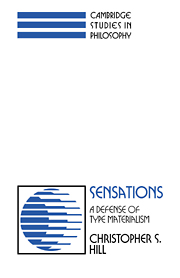5 - Introspective awareness of sensations
Published online by Cambridge University Press: 05 June 2012
Summary
In this chapter I will distinguish between several forms of introspective awareness of sensations and give an account of their most basic properties. My goal is to formulate a theory of introspection that can be integrated with the reductionist view of sensations that I have defended in earlier chapters.
I will also develop a skeletal theory of the epistemological status of introspective beliefs about sensations. It is often claimed in philosophy that all such beliefs are infallible, and that the scope of introspection is sufficiently comprehensive that we can be said to be omniscient with respect to the realm of sensations. I will argue that these claims are much too strong, but I will also maintain that they contain an element of truth. I will conclude with a brief discussion of the question of what we mean when we describe an introspective belief as justified.
Frequently, when we say that a subject is introspectively aware of a sensation of type φ, we are making a claim that has the following truth conditions: (1) S has a sensation of type φ; (2) S believes that he or she has a sensation of type φ; and (3) the belief cited in (2) is both caused and confirmed by the sensation cited in (1). When a claim of this sort is true, S has what I call basic awareness of one of his or her sensations.
Basic awareness is a form of consciousness.
- Type
- Chapter
- Information
- SensationsA Defense of Type Materialism, pp. 117 - 138Publisher: Cambridge University PressPrint publication year: 1991
- 1
- Cited by



